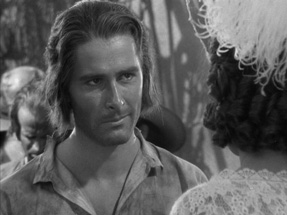Classic Movie Review: Captain Blood
By Stephanie Star Smith
August 17, 2009
BoxOfficeProphets.com

Errol Flynn made his name in Hollywood in swashbuckling roles, beginning with this film, in which he was cast as the romantic lead because the original actor, Robert Donat, was unable to play the part. Warner Bros had just signed Flynn, and thought the handsome, athletic young man might be a good replacement; the studio was also running out of time to find someone to star in the film and shooting was about to begin. Warner Bros' gamble paid off big-time, as Flynn quickly rose to become the undisputed king of the swashbucklers, a mantle he inherited from Douglas Fairbanks, Sr.
Captain Blood is set during the British Civil, a particularly bloody time in that country's history when loyalists to the rightful kings, Charles I and his heir, Charles II, fought against Oliver Cromwell, who sought to establish England as a republic instead of a monarchy. As Royalists, as they were called, soon discovered, Cromwell wanted absolute power, and England under his rule became more a military dictatorship than a republic, where Royalists and any others who dared defy Cromwell's edicts, or even give the appearance of doing so, were rounded up, jailed and either forced into slave labor in the outermost of the Crown colonies, or executed.
Flynn plays a doctor named Peter Blood - a name I shouldn't think would have inspired much confidence in his patients, but there you go - who is neither a Royalist nor one of Cromwell's supporters; he's your basic apathetic citizen who really couldn't care less about politics or royal succession or any of those things, just as long as he can practice medicine and live in peace. One night he's summoned to treat an injured man, and being the adherent to the Hippocratic Oath that he is, he goes to do what he can, not only ignoring but in fact not caring that the man he's treating and those around are Royalists. Unfortunately for Dr Blood, the house where the man has been taken is raided by soldiers loyal to Cromwell, and the good doctor is captured, along with the other Royalists. A charade passing for a trial is held, and the whole lot of accused, including Blood, are sentenced to death. But the doctor makes veiled reference to a medical condition the judge is suffering, suggests some treatments, and has the sentence for all the men commuted to hard labor. Not an ideal solution, but at least they're alive.
Thus the stage is set for the maturation of Doctor Peter Blood, with the schoolhouse life has chosen for the good doctor's lessons being Port Royal, Jamaica, and we watch as the man goes from slave to the favored doctor of the governor of Port Royal - and ardent suitor of the governor's niece - to erstwhile pirate and loyal subject of the Crown and its rightful heir, Charles II. This being a Hollywood swashbuckler, of course, there will be romantic entanglements, danger, adventure, rivalries, and a final, heroic stand wherein the forces for good and justice overcome the forces for wickedness and cruelty, and all turns out right in the end.
What is most interesting about Captain Blood - aside from the fact that it is Errol Flynn's first starring role - is how very similar the plot is to a present-day tale of derring-do, namely Pirates of the Caribbean. I saw Captain Blood shortly after seeing Pirates, and the parallels are quite striking. The action of both films takes place largely in Port Royal - when not at sea, of course - and both focus on a young man of low station who is enamored of the female ward of the governor - daughter in Pirates rather than Blood's niece - and both have to do with piracy taken up for a noble cause. The heroes in both escape from jail during an attack: in Pirates the attack comes from the crew of the Black Pearl, and in Captain Blood, it's from the Spanish Armada. Both pictures even have a very colorful buccaneer to help shoulder the narrative load. Sadly for Captain Blood, however, its dashing pirate character, Captain Levasseur - played by the always-reliably excellent Basil Rathbone - doesn't appear until more than halfway through the film, and only stays around for a few scenes. Believe me, there were many times during the first part of the film when I started wondering when Rathbone would appear, and sorely missing the spark brought to Pirates by Johnny Depp's Jack Sparrow; Captain Blood would have been vastly improved had Rathbone's character appeared earlier in the film and stayed around longer, and I daresay Pirates would have been nearly as monotonous as Captain Blood had Depp's Sparrow not been around from the first reel.
Now that's not a ringing endorsement for seeking out an 80-year-old film, I grant you, but the film is worth checking out the next time it appears on TCM for a variety of reasons, not the least of which is, of course, the presence of Basil Rathbone. But Captain Blood is also worthwhile viewing for the chance to watch a soon-to-be star in his first role, and it also provides a bit of a history lesson, and in a far more entertaining manner than you'd get from a book or in school. It's also a glimpse into the Hollywood of yesteryear, when big-budget productions had more plot underpinnings than hero-wisecracks-to-next-explosion, a time when the Dream Factory really was that, not only for its audiences, but for the many talented people in its employ.
And did I mention Basil Rathbone?